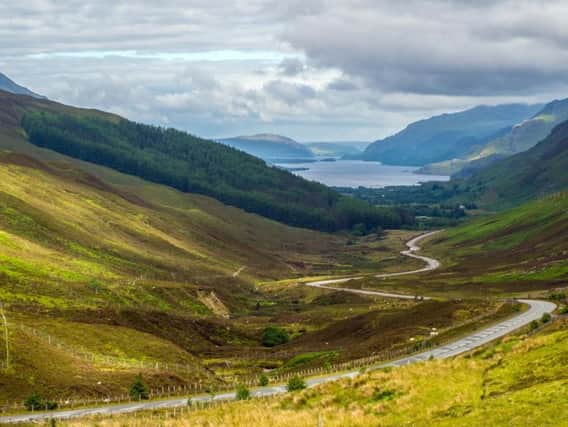Rethink of Scottish tourism industry curb environmental impact and reduce harm to local communities


The Scottish Tourism Alliance has vowed to focus more on attracting "right visitors" instead of simply trying to continually grow the industry as part of a drive to ensure the country becomes "the world leader in 21st century tourism."
The visitors-of-the-future will be encouraged to "live like a local," spend longer in the country and stay in destinations for more than one night, and visit the country outwith the traditional peak periods, as well as help protect the natural landscape and scenery of Scotland for future generations.
Advertisement
Hide AdAdvertisement
Hide AdA new long-term blueprint revealed by the STA, which represents more than 250 industry bodies and associations, states: "We must protect and consider the environment in everything we do."
A draft 2020 strategy, heralded as "a new dawn for our industry" at the annual conference in Edinburgh, heard how there was likely to be an increasing focus on healthy living breaks, food tourism and adventure holidays.
The first major new Scottish tourism blueprint since 2012 commits the industry, which currently supports more than 200,000 jobs, to "understand and responsibly manage" how it impacts on the environment and local communities in future.
Industry leaders also hope to change the image of working in Scottish tourism in the face of the departure of 3000 EU nationals over the last 12 months, with a key aim to "attract, develop and retain a skilled, committed, diverse and valued workforce."
Advertisement
Hide AdAdvertisement
Hide AdDelegates at the EICC in Edinburgh were told that the industry needed to be "brave, outward looking forward thinking, collaborative, responsible and putting our communities, our people, our visitors, our businesses and our environment at the heart of everything we do."
STA chief executive Marc Crothall said: "We know that the global climate emergency agenda has shifted the way we think about where we travel and stay, how we get there; the impact we ourselves have on our global environment and our destinations, we are being much more conscious in making our leisure and food choices.
"We also know that our domestic market is becoming ever more cautious in their decision making and that their level of spend on tourism and hospitality experiences is at risk of further decline.
"As such, there is an increasing need to attract more visitors, and the right visitors, to Scotland year-round in order to grow our tourism industry.
Advertisement
Hide AdAdvertisement
Hide Ad"We want our visitors to experience more – enjoying immersive ‘live like a local’ rich experiences.
"We need to market the whole of Scotland and ensure that our visitors can experience all of what our landscapes and destinations have to offer."
Mr Crothall told delegates that the climate emergency, the prospect of Brexit and the potential introduction of a tourist tax in some areas had already left the industry in a "fragile state."
He added: "As a result of what is happening in terms of trends, forecasts and future consumer behaviour, there is a need for our tourism industry, government, public sector and communities to collectively respond, adapt and collaborate to deliver a responsible, sustainable, managed growth for the future. Future success will only be achieved through partnership.
Advertisement
Hide AdAdvertisement
Hide Ad"Our mindset as a nation and as a sector is now shifting from attracting volume to delivering greater economic and social benefits for our nation and for our local communities – the people who live and work in all our villages, towns and cities.
"The people who work in your businesses. The time to change and adapt has come.
"It is now more important than ever that we create the very best memories for everyone who visits and experiences all that Scotland has to offer with no long-term damage to our environment."
Stephen Leckie, chair of the STA, who also runs Crieff Hydro in Perthshire, said: "Brexit and a weak global economy were not part of our landscape in 2012 and both have undoubtedly had a significant impact on our visitor markets (although some of that has been positive), however we are experiencing decline in spend by our core market (UK residents), as the cost of living bites and household budgets continue to be squeezed.
Advertisement
Hide AdAdvertisement
Hide Ad"Decisions on where we visit, when we go and what we can afford to do as part of that visit are being given more careful consideration than ever before. The way people travel and stay has of course changed too.
"The rise in short term lets and the rise in the popularity of Airbnb has reduced the average visitor accommodation spend as typically the self-cater rate per person is below that of more traditional hotel and B&B accommodation.
"Many more Scottish families are also opting to do day trips instead of overnight short breaks. The rise of low-cost budget travel makes it harder for us to remain competitive within the global market. It is today a much bigger challenge than it was in 2012 especially where our competitor destinations have lower levels of taxation and are becoming increasingly easier and cheaper to access.
"Scotland has for the first time in the last few years experienced what some refer to as ‘overtourism’ in certain areas, creating pressure on infrastructure, with negative impacts on local communities and widespread reporting of that in the media.
Advertisement
Hide AdAdvertisement
Hide Ad"The threat and no doubt subsequent reality of the introduction of a tourist tax by some local authorities has also created ripples that have travelled far and wide, reinforcing a perception that Scotland is an unwelcoming and expensive destination.
"We have also lost a significant proportion of our workforce as a result of Brexit and many of our tourism businesses are now facing a recruitment crisis.
"We simply don’t have the number of people we need working in our industry to deliver the type of product to the world we had hoped and planned to."